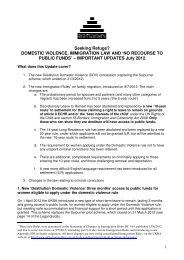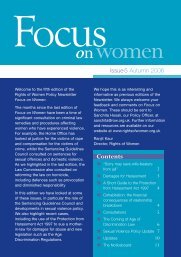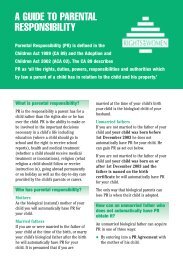Seeking Refuge? - Rights of Women
Seeking Refuge? - Rights of Women
Seeking Refuge? - Rights of Women
Create successful ePaper yourself
Turn your PDF publications into a flip-book with our unique Google optimized e-Paper software.
8<br />
Negative Decisions and Appeals<br />
Introduction<br />
Many people are forced to leave their country and<br />
seek safety somewhere else. A claim for asylum or<br />
some other form <strong>of</strong> protection in the UK is<br />
decided initially by a case-owner in the UK<br />
Border Agency 24 . The UK Border Agency is the<br />
part <strong>of</strong> the Home Office that deals with asylum,<br />
immigration and nationality issues. If your initial<br />
application for protection to the UK Border<br />
Agency is refused, you can appeal against it to<br />
the Asylum and Immigration Tribunal. This<br />
section will explain how you can appeal against a<br />
negative decision to the Asylum and Immigration<br />
Tribunal and what your options are, if your appeal<br />
is also refused.<br />
The law discussed here is very complicated.<br />
This Chapter is written to give you<br />
information about the law, but it is not legal<br />
advice. If you have applied for protection in<br />
the UK, or are thinking about doing this, it is<br />
very important that you seek legal advice<br />
from a solicitor or immigration advisor. You<br />
can also contact <strong>Rights</strong> <strong>of</strong> <strong>Women</strong>’s legal<br />
advice line. See Chapter 12 at the end <strong>of</strong> this<br />
book for information about organisations<br />
that provide legal advice.<br />
Refusal <strong>of</strong> your initial claim<br />
A claim for asylum or some other form <strong>of</strong><br />
protection in the UK is decided initially by a caseowner<br />
in the UK Border Agency.<br />
“<br />
The case-owner is the person<br />
who is responsible for your<br />
case. You may have one caseowner<br />
throughout your case, or<br />
you may have different caseowners<br />
at different stages in<br />
the process.<br />
”<br />
Case-owners have a number <strong>of</strong> responsibilities<br />
including:<br />
- Conducting your asylum interview.<br />
- Working with your legal representative to<br />
clarify the issues in the case.<br />
- Controlling the progression <strong>of</strong> your case by<br />
altering the times that certain things are<br />
done (for example the date <strong>of</strong> the interview),<br />
if flexibility is required.<br />
- Making an initial decision on whether you<br />
should be granted protection in the UK, or<br />
whether your claim should be refused.<br />
Your legal representative (or you, if you don’t<br />
have a legal representative) should be in close<br />
contact with your case-owner(s) throughout<br />
the process.<br />
When making a decision about whether or not<br />
you should be <strong>of</strong>fered protection in the UK, the<br />
case-owner should consider:<br />
• the information and evidence that you have<br />
given them. This will include what you have<br />
said in your interview and any other evidence<br />
that you have provided (for example, from<br />
other witnesses, or in a medical or other<br />
report); and,<br />
• the relevant law.<br />
There are three sources <strong>of</strong> law that determine<br />
who is entitled to protection in the UK:<br />
• the <strong>Refuge</strong>e Convention 1951;<br />
• the European Convention on Human<br />
<strong>Rights</strong>1950; and<br />
• European Union Law.<br />
23<br />
Temporary Protection Directive (Council Directive 2001/55/EC).<br />
24<br />
It used to be called the Border and Immigration Agency (the BIA) and before that the Immigration and Nationality Directorate<br />
(the IND).<br />
45
















